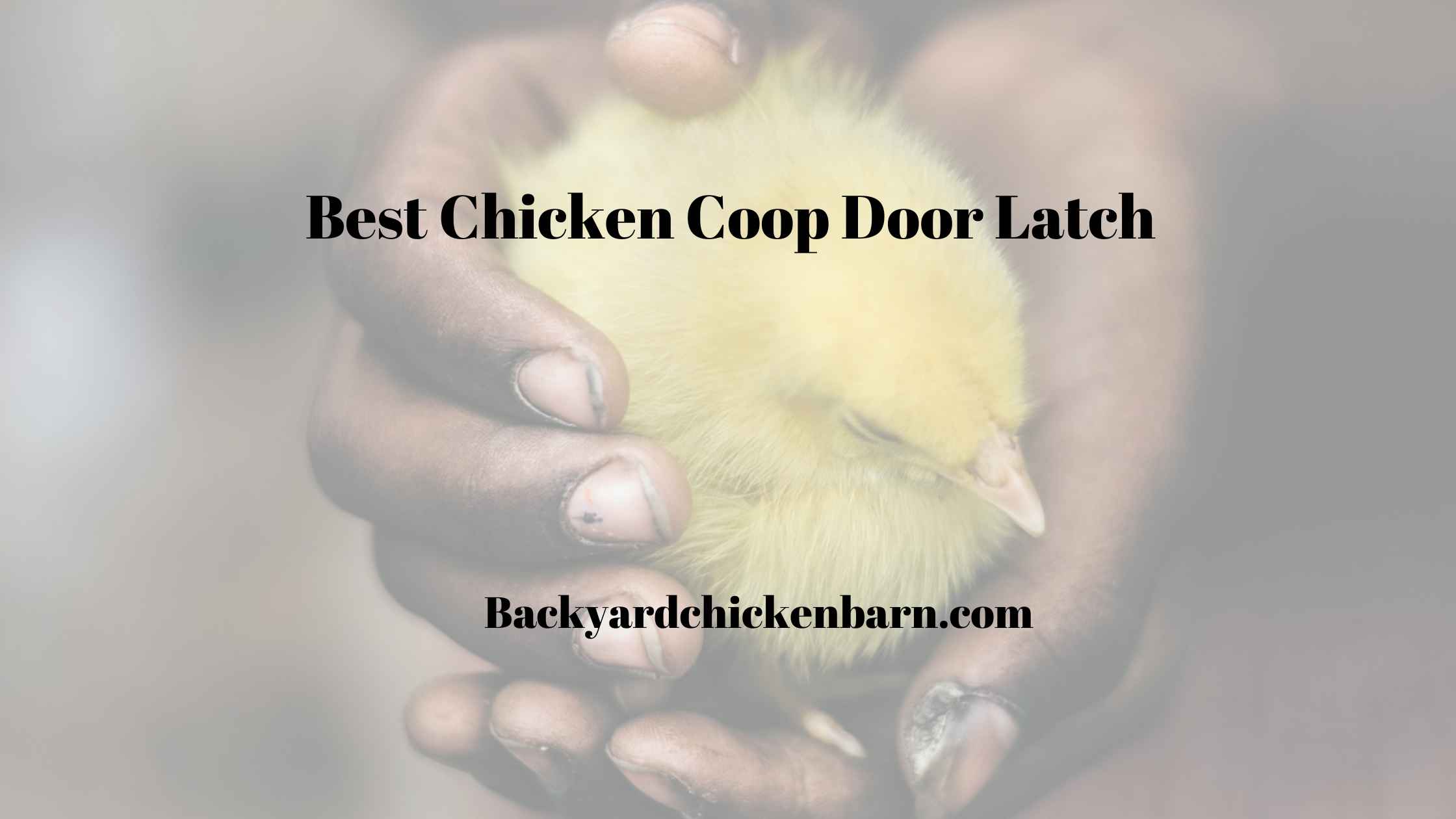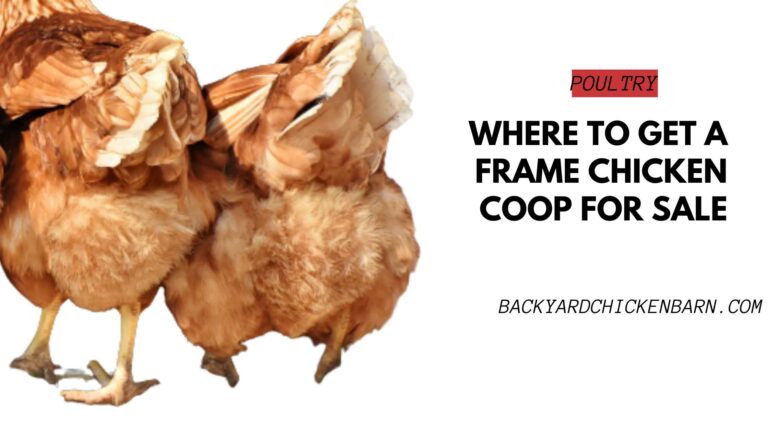The Best Chicken Coop Door Latch
Keeping your chickens safe from predators is paramount, and choosing the best door latch for your chicken coop is a critical step in ensuring their security.
The right latch not only keeps your chickens safe but also makes it easy for you to access the coop when needed.
Why is a Good Chicken Coop Latch Important?
- Protection from Predators: Foxes, raccoons, and other predators are quite clever. They can open simple latches, so having a robust and secure latch is vital.
- Ease of Access: A good latch should be easy for you to operate, even with one hand if you’re carrying feed or tools.
- Durability: The latch should be sturdy enough to withstand the elements and regular use.
Types of Chicken Coop Latches
- Slide Bolt Latches: These are simple sliding bolts that can be locked in place. They’re common, easy to install, and reasonably secure.
- Twist Latches: This type requires a twist to unlock, making it harder for predators to figure out.
- Padlock Latches: For the highest security, some keepers prefer a latch that can be padlocked. This is especially helpful if you’re in an area with very persistent predators.
- Spring-Loaded Latches: These automatically snap into place when the door is shut. It’s quick and convenient, but make sure the spring is strong enough to deter animals.
- Double Latches: Using two latches, typically at the top and bottom of the door, can add an extra layer of security.
- Electronic or Automated Latches: These are often used with automated coop doors and may have features like timers or remote controls.
What to Consider When Choosing a Latch
- Material: Rust-resistant materials like stainless steel or coated metal are ideal.
- Ease of Use: If it’s too complicated, you might find it frustrating, especially in poor weather or low light.
- Installation: Some latches can be easily screwed in, while others may require more tools and time.
- Price: While you shouldn’t skimp on security, there’s a range of price points available. Choose the best latch you can afford.
- Reviews: Check product reviews or ask other poultry keepers for recommendations.
Additional Security Measures
- Regularly Inspect: Even the best latch is only as good as the door and frame it’s attached to. Regularly inspect your coop for signs of wear or damage.
- Predator Guards: Adding a barrier or skirt around the base of your coop can deter digging animals.
- Night Checks: Make it a routine to ensure that all chickens are inside and the door is securely latched every evening.
- Motion Lights: Installing motion-sensitive lights can scare off some predators.
Conclusion
Your chickens’ safety is your responsibility. While no latch is 100% predator-proof, choosing the right one and pairing it with other security measures will give your flock the best chance at a peaceful night’s sleep.
Invest in a durable, easy-to-use latch that suits your coop design and local predator concerns.
ALSO SEE: Best Portable Chicken Coop on Wheels

FAQs on Chicken Coop Door Latches
- Why is it essential to have a chicken coop door latch?
- A latch is vital to protect chickens from potential predators and to ensure they remain safe within the coop.
- Can raccoons open chicken coop latches?
- Yes, raccoons are very dexterous and can open many simple latches. It’s crucial to choose a latch that’s raccoon-proof.
- How do I make my chicken coop raccoon-proof?
- Use a complex latch system, perhaps even one that requires two separate actions to open.
- What materials are best for coop latches?
- Stainless steel or coated metal are great choices because they’re durable and rust-resistant.
- Can I use padlocks for added security?
- Yes, padlocks can add an extra layer of security, especially against smarter predators.
- Are electronic latches safe for chickens?
- Yes, as long as they’re properly installed and regularly checked for functionality.
- Do I need to install multiple latches on my coop door?
- It’s not mandatory, but having two latches (one at the top and one at the bottom) can increase security.
- How often should I check and maintain my coop latch?
- Regular inspections, at least monthly, are a good idea to ensure everything remains in working order.
- Is it better to have an inward-opening or outward-opening coop door?
- Inward-opening doors can provide an extra layer of security against predators.
- What other security measures can I take alongside a sturdy latch?
- Consider motion-activated lights, coop skirts, and regular security checks.
- Can I automate my chicken coop door?
- Yes, there are automated doors with electronic latches available, which can be set on timers or operated remotely.
- Will weather affect my latch’s durability?
- Over time, extreme weather can wear down latches, especially if they aren’t made of weather-resistant materials.
- Do all coop doors come with latches?
- Not always. Some might come with basic latches, but you may want to upgrade for added security.
- Can predators like snakes enter even if the door is latched?
- Snakes might find other entry points, so ensure the entire coop is secure, not just the door.
- How do I repair a broken latch?
- Depending on the damage, you might need to replace parts, tighten screws, or even replace the whole latch.
- Can a chicken get trapped or injured by a latch?
- It’s rare, but ensure there are no sharp edges and that the latch functions smoothly.
- What should I do if my latch becomes rusty?
- Replace it immediately, as a rusty latch can be weak and might fail.
- How much does a good coop latch cost?
- Prices vary based on design and material, but investing in a high-quality latch is worth the safety it provides.
- Can I install a coop latch myself?
- Yes, most latches come with installation instructions and require basic tools.
- What’s the difference between a latch and a lock?
- A latch fastens the door closed, while a lock requires a mechanism like a key or combination to open.
- Should I use both a latch and a lock?
- For added security, especially in areas with persistent predators, it’s a good idea.
- Can I add a chain to my coop door for added security?
- Yes, a chain can deter larger predators but ensure it’s tightly fastened and doesn’t have large gaps.
- How do twist latches work?
- Twist latches require a twisting motion to unlock, making them more complex for predators.
- Can a child open a coop latch?
- Depending on the design, some latches might be challenging for young children, which can be an advantage for safety.
- Is there any downside to electronic or automated latches?
- They might fail due to battery or mechanical issues, so regular checks are essential.
- Should I be concerned about my chickens accidentally unlatching the door from inside?
- Most latches are designed to be outside-facing and are difficult for chickens to manipulate.
- Do latches work for other poultry like ducks or turkeys?
- Yes, they can be used for any poultry coop, but size and design might vary.
- Are there latches that can be opened with foot pedals for hands-free access?
- Yes, some designs allow for foot operation, which can be convenient when carrying items.
- Can wind or other environmental factors accidentally open a coop latch?
- A properly installed and high-quality latch should remain closed in most environmental conditions.
- Is it okay to use a latch designed for other purposes on my chicken coop?
- As long as it provides the necessary security and durability, it’s okay. However, chicken-specific latches are often best.
- How do I know if my latch has been tampered with?
- Look for scratches, marks, or misalignment. Regular checks will help you spot any irregularities.
- Do spring-loaded latches wear out quickly?
- The spring mechanism can wear out over time, so it’s essential to check these latches regularly.
- What do I do if my latch becomes noisy or squeaky?
- A bit of lubrication (like WD-40) should help alleviate the noise.
- Can I customize or decorate my coop latch?
- Yes, as long as any modifications don’t compromise its functionality or safety.
- Can I use magnetic latches for my coop?
- While they can be convenient, they might not offer the same security level as mechanical latches.
- What’s the best latch for a coop in an urban environment?
- Consider latches that offer the best protection against potential human threats as well as urban wildlife.
- Is there a specific latch design best for cold climates?
- Opt for rust-resistant materials and ensure that the latch doesn’t jam due to ice or snow.
- How do I clean and maintain my coop latch?
- Regularly wipe it down, remove any dirt or debris, and lubricate if necessary.
- Are there any safety precautions to take when installing a latch?
- Ensure there are no sharp edges, and always use the right tools to avoid injury.
- What should I do if a predator manages to bypass my latch?
- Reassess the coop’s overall security, consider adding more security measures, and possibly upgrade to a more secure latch.



